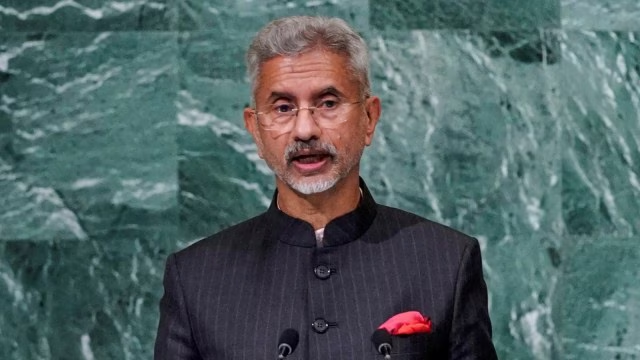The Unnamed Accused: Jaishankar’s UN Speech Puts Pakistan in the Global Crosshairs

Image via The Indian Express
NEW YORK – The great hall of the United Nations General Assembly is a theatre of carefully chosen words, where direct confrontation is often veiled in the language of diplomacy. It was on this global stage on Saturday that India’s External Affairs Minister, Dr. S. Jaishankar, delivered a diplomatic masterstroke: a powerful and damning indictment of a nation that sponsors terror, all without ever mentioning its name. In a speech that resonated with sharp clarity, he put Pakistan squarely in the global crosshairs, holding it accountable for a legacy of violence that has left scars across the world.
Dr. Jaishankar’s address was a defining moment in India’s foreign policy presentation. He masterfully wove together India’s aspirations as a rising global leader with an uncompromising stance on national security. The speech was not just an accusation; it was a meticulously crafted argument presented to the court of world opinion, compelling every nation present to confront the uncomfortable truth about the epicenters of international terrorism.
A Masterclass in Diplomatic Condemnation
The most potent part of the minister’s speech was its strategic ambiguity. Rather than getting into a direct and messy bilateral squabble, which often allows other nations to disengage, Dr. Jaishankar framed the issue of terrorism as a collective global problem with a common, identifiable source.
“We are all gathered here to build a better world. But that is not possible if we continue to tolerate those who build a better terrorism,” he stated, his voice calm but firm. “It is a matter of profound regret that even today, the nurseries of terrorism remain active. While the world’s attention may shift, the facts on the ground do not. The trail of evidence from so many terrorist attacks, on so many continents, often leads back to the same ecosystem of hate. The world has not forgotten where the masterminds of these plots find safe havens and state support.”
By referring to “that one country” and its “ecosystem of hate,” he forced his audience—and the global media—to connect the dots. The strategy was clear: make the accusation so obvious that a name becomes unnecessary. This approach makes it difficult for the accused nation to respond directly and elevates India’s complaint from a neighborhood dispute to a matter of international peace and security.
A History Written in Blood
For India, these were not abstract talking points. They were a direct reference to a history of pain. Dr. Jaishankar’s words echoed with the memory of the 2008 Mumbai attacks, where terrorists from the Pakistan-based Lashkar-e-Taiba not only attacked Indian citizens but also specifically targeted foreign nationals at luxury hotels, demonstrating their global reach. His speech invoked the 2019 Pulwama attack, where a suicide bomber killed 40 Indian paramilitary personnel, an act proudly claimed by the Jaish-e-Mohammed, which operates from Pakistan. By alluding to these events, he reminded the assembly that India’s fight against terrorism is a fight on behalf of all civilized nations.
India’s Broader Vision: A Leader for the Global South
While the veiled attack on Pakistan was the sharpest edge of his speech, the bulk of it was dedicated to presenting India as a constructive and indispensable global partner. Dr. Jaishankar passionately advocated for the interests of the “Global South,” the vast community of developing nations often left behind in global decision-making.
He highlighted India’s G20 presidency as a period when New Delhi championed issues like debt relief for vulnerable countries, equitable access to climate financing, and food and energy security. He presented India’s homegrown Digital Public Infrastructure—a revolutionary system for financial and social inclusion—not as a national achievement, but as an open-source model that India is willing to share with the world to help others leapfrog development challenges.
“India’s progress is for the world to share,” he declared. “We believe in a model of cooperation that is consultative, demand-driven, and sustainable. We are a partner that listens, not a donor that dictates.”
This was coupled with a forceful demand for the reform of the United Nations Security Council. He called the council’s current structure a relic of the post-1945 era, arguing that its lack of inclusiveness and the paralysis caused by the veto have rendered it ineffective in addressing modern conflicts. “A reformed UN is not a choice; it is a necessity,” he urged, making a compelling case for India’s permanent membership.
The Inevitable Diplomatic Aftermath
As expected, the Pakistani delegation is preparing to use its “Right of Reply” to issue a rebuttal. This response is anticipated to be a staunch denial of the terror allegations, which they will likely label as baseless Indian propaganda. The Pakistani representative is expected to pivot the discussion to the situation in Jammu and Kashmir and accuse India of using the issue of terrorism to deflect from its own human rights record.
However, the power of Dr. Jaishankar’s speech lies in its construction. He has already framed the issue in global terms, making Pakistan’s bilateral, Kashmir-centric response seem narrow and defensive.
In conclusion, the speech was a brilliant showcase of India’s two-track foreign policy. On one track, a hard, uncompromising line against those who threaten its security. On the other, a soft, collaborative, and aspirational vision of India as a “Vishwa Mitra”—a friend to the world. It was the message of a rising power that is confident in its abilities and clear-eyed about the dangers it faces, a nation ready to lead and unwilling to be silent.